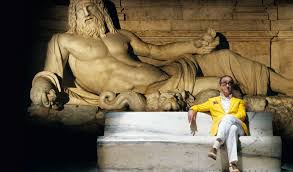Each year, the Academy of Motion Picture Arts and Sciences releases a shortlist of foreign language films that are eligible for an Academy Award. This year’s shortlist will be announced in late December. For more on how the process works, click here. In anticipation of that event, we will look at 2013’s nine shortlisted films. First up is Italy’s official selection and the eventual Oscar winner, The Great Beauty.
The Great Beauty begins with a group of Japanese tourists sightseeing in Rome. One man wanders away from the others to an overlook. The Eternal City glistens in the sunlight as a choir sings. The man collapses and dies from the wonder of it all.
That sense of wonder and the pervasiveness of death are woven throughout The Great Beauty, directed by Paolo Sorrentino with masterful elegance. Sorrentino is working here in the style of the great Italian directors of decades past: Roberto Rossellini, Michelangelo Antonioni and, most obviously, Federico Fellini. The Great Beauty is in many ways a spiritual sequel to La Dolce Vita.
The film follows a few weeks in the life of Jep Gambardella (Toni Servillo), a writer who has been living off the reputation of a prize-winning novel for decades. Jep is living the sweet life — rising at noon, wearing impeccably tailored suits, attending lavish dinner parties and all-night raves where he does some kind of electronica line dancing (I’m not hip enough to know what is actually going on there). Then, on his 65th birthday, he finds that a long-lost love has died. This plunges Jep into an existential crisis. He begins behaving strangely, wandering through Rome, getting botox and taking up with a stripper (Sabrina Ferlilli) half his age.
That synopsis makes The Great Beauty seem like every indie dramedy you’ve ever seen, but the film is so much more than that. If this film had been made in Hollywood the stripper would have been a single mom with an adorable, wise-beyond-his-years kid and Jep would have learned heartwarming lessons about the joys and responsibilities of adulthood.
Instead, the second half of the film takes a deeply spiritual tone. It becomes almost an earthbound (actually a Rome-bound) 2001 as Jep looks for his place in the universe, but for him there is no transformation into star child . Instead, he is left in Rome — both the great beauty of the title and a place of “wretched squalor and miserable humanity”–to muddle along as best he can.
Much of the success of The Great Beauty is because of Servillo, surely Italy’s greatest living film actor. He has a mesmerising screen presence reminiscent of Marcello Mastroianni and he imbues Jep with a large- heartedness that overcomes the character’s more shallow traits. It’s a shame that Oscar voters so often overlook foreign language performances because Servillo is better than everyone who was nominated for Best Actor with the exception of Chiwetel Ejiofor.
As marvelous as Servillo is, The Great Beauty’s (for lack of a better phrase) great beauty, lies in its rich visuals. Sorrentino and cinematographer Luca Bigazzi sweep their camera through Rome’s streets and along the Tiber River, capturing well-known monuments and little-seen alleys (the end credits are not to be missed). Modern Hollywood has so force-fed moviegoers with CGI landscapes that the beauty of the real can be quite astonishing.
The Great Beauty is a deserving winner despite the fact that some of the best foreign films of 2013 weren’t eligible (Blue is the Warmest Color, Stranger by the Lake) or weren’t shortlisted (Gloria, Wadjda). It probably would have won even if some of these films had been eligible (there’s not a snowball’s chance in hell either Blue is the Warmest Color or Stranger by the Lake were going to get anywhere near the podium). Also, it’s just the kind of film Oscar voters go for: beautiful scenery, not too political and an uplifting ending. The fact that The Great Beauty rises far above the mediocrity of most Best Picture winners is a testament to the talents of Sorrentino, Servillo and the rest of the cast and crew.
Grade: A minus. The Great Beauty has slight flaws –too many cliches, too many arty camera movements–but it is still a deserving Oscar winner and a worthy successor to the great Italian film tradition.
The Great Beauty is streaming on Hulu Plus. It is also available on DVD from The Criterion Collection.
Up next week is Belgium’s official selection, The Broken Circle Breakdown.


